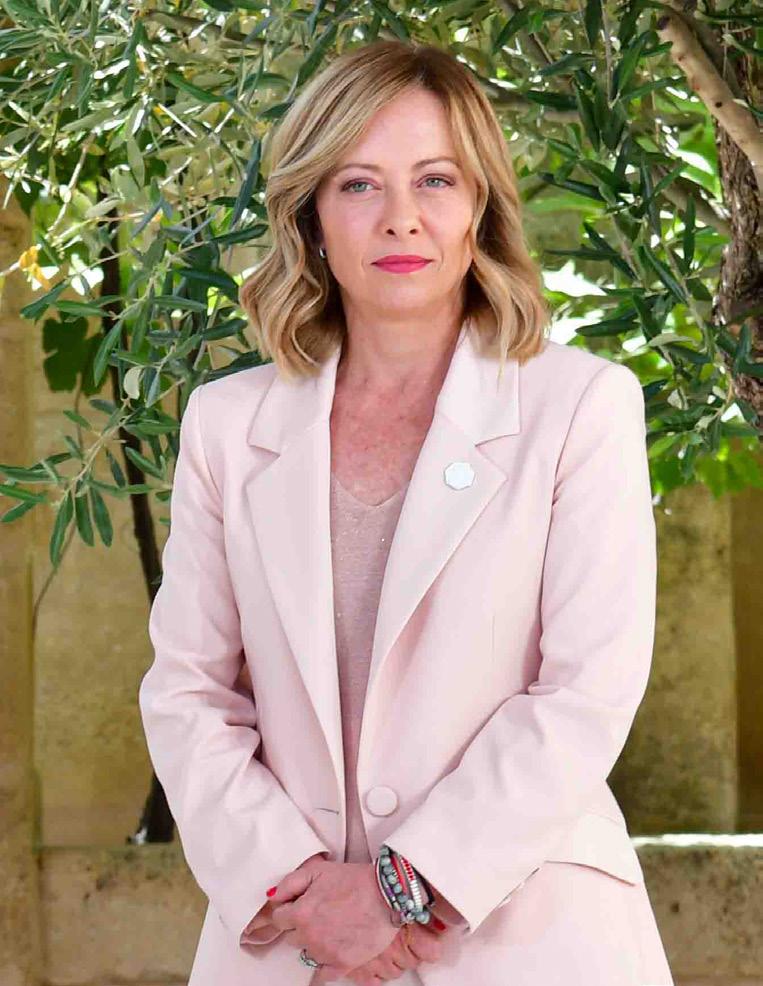
4 minute read
G7
Giorgia Meloni PRIME MINISTER, ITALY
I am very proud, it is an honour twice over for me to welcome you, in my capacity as both Prime Minister of the Italian Republic and current President of the Group of Seven. This is the seventh time Italy has had the responsibility of leading this forum, which will celebrate its 50th anniversary in 2025. Over these last decades, it has clearly taken on an irreplaceable role in managing global crises, and primarily those that endanger our freedom and our democracies.
Italy decided to host the Leaders’ Summit in Puglia, and this was by no means a random choice. We chose this location because Puglia is a region in the south of Italy, and the message we want to send out is that the G7 under the Italian Presidency wants to strengthen its dialogue with nations in the Global South. We made this decision because Puglia has historically acted as a bridge between East and West. It is a land of dialogue in the centre of the Mediterranean, that ‘Middle Sea’ connecting the world’s two major maritime areas: the Atlantic on one side, and the Indo-Pacific on the other. That sea is also represented in the logo that Italy has chosen for its G7 Presidency, together with another symbol of our identity: a centuries-old olive tree, with its strong roots and its lush foliage looking to the future. Among the leaves, there are seven olives representing our nations and their cooperation on major global challenges. All these symbols provide an overview of the Italian Presidency’s objectives: on the one hand, to clearly highlight what unites us and strengthen our cooperation, and, on the other, to be able to talk with everyone. In other words, the G7 is not a fortress closed off to others which perhaps has to defend itself in some way; it embodies values that we open up to the world in order to foster shared development.
There are many items on the agenda for our working sessions. We will of course have the opportunity for plenty of in-depth discussion over the next two days, covering what has become a very full programme. We will of course be talking about the ongoing crises, starting with Ukraine and the Middle East. We will build on the work by the Japanese Presidency, moving forward with regard to both the need to create robust and controllable supply chains and what is probably the most complex challenge of our time: the advent of generative Artificial Intelligence.
There is clearly the need to seize the opportunities presented by this challenge, while governing its risks. We will once again be discussing the importance of our increased focus on the Indo-Pacific and, as you know, the Italian Presidency also wanted to devote significant attention to a continent that is crucial for all our futures: Africa. With its difficulties and opportunities, Africa needs a different approach from us than the one we have often shown in the past. Another key issue the Italian Presidency has prioritised is also linked to Africa, and not only to Africa, and that is the matter of migration and the increasingly concerning role of human trafficking organisations that are exploiting desperate human beings.
So, there is a lot of work to do, but I am certain our discussions over he next two days will be able to deliver tangible and measurable results. I therefore wish to sincerely thank all of you for being here. It is a source of pride for us and the whole of Italy to host you, and I hope that, despite working a lot over the next two days, you will nevertheless also get a taste of the hospitality for which Italy is famous the world over. Thank you.
Italy decided to host the Leaders’ Summit in Puglia, and this was by no means a random choice. We chose this location because Puglia is a region in the south of Italy, and the message we want to send out is that the G7 under the Italian Presidency wants to strengthen its dialogue with nations in the Global South.





